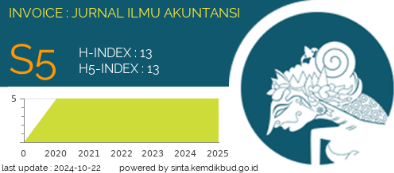Prediction Analysis of Potential Fraudulent Financial Statement Risks Using the Fraud Score Model (In Mining Companies Listed on the Indonesian Stock Exchange 2018-2020)
Abstract
Full Text:
PDFReferences
Adil, M. (2022). Accountability and Transparency in the Public and Private Sector. International Journal Of Humanities Education and Social Sciences (IJHESS), 1(6).
Adiningrat, A. A., Ruhayu, Y., Rustan, R., Wahyuni, S., & Fitrianti, A. N. (2022). The Effect of Financial Literature and Islamic Work Motivation on the Performance of Food Micro, Small and Business Enterprises (MSMEs) in Makassar City. Budapest International Research and Critics Institute-Journal (BIRCI-Journal), 5(4), 30836-30845.
Adiningrat, A. A., & Warda, W. (2023). The Development of Intensity Model on Technopreneurship to Improve Turnover in Micro, Small and Medium Enterprises (MSMEs) Culinary in Makassar, Indonesia. International Journal of Economics Development Research (IJEDR), 4(2), 218-228.
Abdi, M. N., Suarni, A., & Arham, A. (2022). Analisis Kepailitan Perusahaan Yang Tercatat di BEI Sub Sektor Telekomunikasi. Jurnal Multidisiplin Madani, 2(6), 2705-2716.
Arman, A. (2021). Analysis of Motor Vehicle Tax Revenues before and after the Tax Kring. Point of View Research Accounting and Auditing, 2(2), 144-149.
Arman, A., & Mira, M. (2021). Does Tax Avoidance Make Do Earning Opacity?. Atestasi: Jurnal Ilmiah Akuntansi, 4(1), 88-95.
Arman, A., Mira, M., Masrullah, M., Agustan, A., Firmansyah, F., & Aditya, R. (2023). Financial Literacy and Assistance in Compiling Independent Financial Reports Using Expense IQ Money Manager. Technium Sustainability, 4, 7-12.
Arsal, M. (2021). Impact of earnings per share and dividend per share on firm value. ATESTASI: Jurnal Ilmiah Akuntansi, 4(1), 11-18.
Arsal, M., & Arsal, D. (2019, August). Urban forest and financial resources perspective in Indonesia. In IOP Conference Series: Materials Science and Engineering (Vol. 593, No. 1, p. 012006). IOP Publishing.
Arsal, M., HAMID, N. I. N. B. A., Arsal, R., & Basri, M. (2014). Consumer Behavior of the Islamic banking. International Journal of Science Commerce and Humanities, 59-64.
Arniati, A., Arsal, M., Akhmad, A., Asdar, A., & Adiningrat, A. A. (2020). Impression of Student Knowledge on Decisions Become a Customer of Islamic Banks. International Journal of Business Economics (IJBE), 1(2), 145-152.
Hutagaluh, O., Rustam, A., Sangadji, S. S., Baharuddin, I., & Kurniullah, A. Z. (2020). Responsive Leadership in Preventing Transmission of Covid-19 in the Indonesia-Malaysia Border Area.
RUM, M., ARSAL, M., KHALID, A., & AWALUDDIN, M. (2023). The Distribution of Tax Collectability, Quality of Tax Services Efforts to Tax Coverage Ratio. 유통과학연구 (JDS), 21(6), 107-117.
Rustan, R., Adiningrat, A. A., & Aisyah, S. (2023). Optimizing of Resources Utilization Through Islamic Spiritual Entrepreneurship to Improve The Welfare of Coastal Communities. International Journal of Economics Development Research (IJEDR), 4(2), 170-180.
Rustan, S. A., Aisyah, S., Adiningrat, A. A., Rustam, A., & Anggoro, M. Y. A. R. (2022). Strengthening Of Marketing Information Systems and Accounting Information Systems for Micro Small and Medium Enterprises (UMKM) Food Culinary Makassar. Budapest International Research and Critics Institute-Journal (BIRCI-Journal), 5(4), 30580-30585.
Suarni, A., & Amelia, R. (2023). Analysis of Mosque Financial Management in Ujung Bulu District, Bulukumba Regency, South Sulawesi, Indonesia. Public Sector Management and Accounting Research, 2(2), 10-22.
Astuti, C. D., & Pangestu, N. (2019). Kualitas Audit, Karakteristik Perusahaan dan Manajemen Laba Riil. Media Riset Akuntansi, Auditing & Informasi, 19 (2), 191-208.
Annisya, M., Lindrianasari, & Asmaranti, Y. (2016). Analisis faktor-faktor yang mendorong penipuan laporan keuangan. Jurnal Bisnis Dan Ekonomi (JBE), 23(1), 72–89.
Cristansy, J., & Ardiati, A. Y. (2018). Pengaruh kompleksitas perusahaan, ukuran perusahaan, dan ukuran kap terhadap fee audit. Media Riset Akuntansi, Auditing & Informasi, 30(2), 198–211.
Felicya, C., & Sutrisno, P. (2020). Pengaruh karakteristik perusahaan, struktur kepemilikan dan kualitas audit terhadap manajemen laba. Jurnal Bisnis dan Akuntansi, 22(1), 129-138.
Hidayatun, F., & Juliarto, A. (2019). Fraud Triangle Dan Fraud Diamond Model Dalam Prediksi Kecurangan Laporan Keuangan. Diponegoro Journal of Accounting, 8(4).
Harahap, A. T. D., Majidah, & Triyanto, D. N. (2017). Pengujian Fraud Diamond dalam Kecurangan Laporan Keuangan (Studi Kasus pada Perusahaan Pertambangan yang Terdaftar di Bursa Efek Indonesia Tahun 2011 - 2015). E-Proceeding of Management, Vol.4(1), 420–427.
Iskandar, M. J., & Trisnawati, E. (2010). Faktor-faktor yang mempengaruhi audit report lag pada perusahaan yang terdaftar di Bursa Efek Indonesia. Jurnal bisnis dan akuntansi, 12(3), 175-186.
Rini, V. Y., & Achmad, T. (2012). Analisis Prediksi Potensi Risiko Fraudulent Financial Statement melalui Fraud Score Model. Diponegoro Journal of Accounting, Vol. 1, No.1
Sari, M. R., & Rofi, M. A. (2020). Faktor-Faktor Yang Memotivasi Kecurangan Laporan Keuangan. Journal of Management and Business Review, 17(1), 79–107. https://doi.org/10.34149/jmbr.v17i1.202
Sugiyono, 2008. Populasi Dan Sampel Menurut Para Ahli
Siddiq, F. R., Achyani, F., & Zulfikar, Z. (2017). Fraud Pentagon dalam Mendeteksi Financial Statement Fraud.
Saadah, N. (2018). Pengaruh Kualitas Audit Terhadap Pengungkapan Kecurangan Laporan Keuangan Perusahaan. Jurnal Ekonomi Dan Bisnis, 21, 18–27.
Siswantoro, S. (2020). Pengaruh faktor tekanan dan ukuran perusahaan terhadap kecurangan laporan keuangan. Jurnal Akuntansi, Keuangan, Dan Manajemen, 1(4), 287–300. https://doi.org/10.35912/jakman.v1i4.76
Tembalang, S. SH (2021). ANALISIS DETERMINAN FINANCIAL STATEMENT FRAUD DENGAN PENDEKATAN FRAUD DIAMOND. Vol.10, No.1
Ulfah, M., Nuraina, E., & Wijaya, A. L. (2017). Pengaruh Fraud Pentagon Dalam Mendeteksi Fraudulent Financial Reporting (Studi Empiris Pada Perbankan Di Indonesia Yang Terdaftar Di Bei. Forum Ilmiah Pendidikan Akuntansi, 5(1), 399–418. Fraud, Fraud Pentagon, Fraudulent Financial Reporting
Vivianita, A., & Indudewi, D. (2019). Financial Statement Fraud Pada Perusahaan Pertambangan Yang Dipengaruhi Oleh Fraud Pentagon Theory (Studi Kasus Di Perusahaan Tambang Yang Terdaftar Di Bei Tahun 2014-2016). Jurnal Dinamika Sosial Budaya, 20(1), 1. https://doi.org/10.26623/jdsb.v20i1.1229
DOI: https://doi.org/10.26618/inv.v5i2.12312
Refbacks
- There are currently no refbacks.
Invoice : Jurnal Ilmu Akuntansi Is Licenced Under a Creative Commons Attribution-Noncommercial-Noderivatives 4.0 International License










